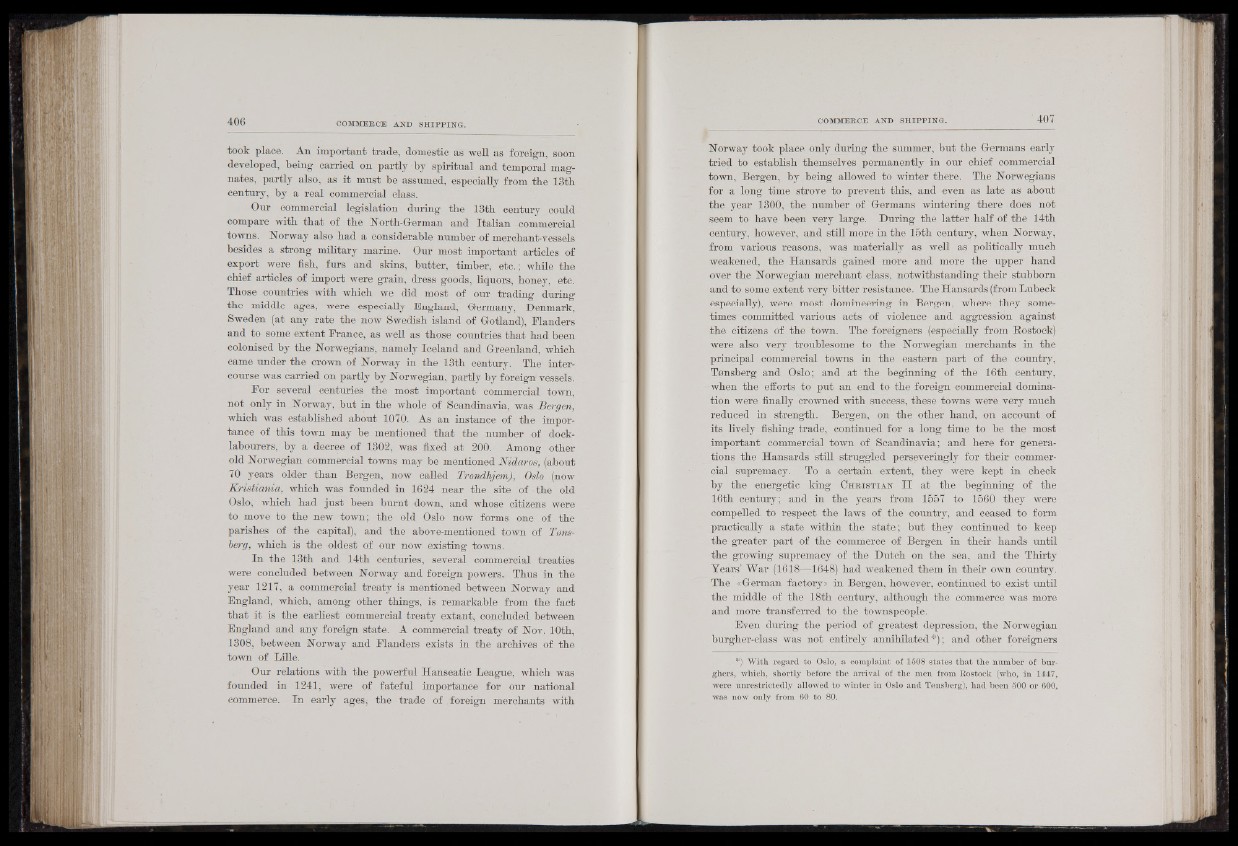
took place. An important trade, domestic as well as foreign, soon
developed, being carried on partly by spiritual and temporal magnates,
partly also, as it must be assumed, especially from the 13tb
century, by a real commercial class.
Our commercial legislation during tbe 13tb century could
compare with tbat of tbe North-German and Italian commercial
towns. Norway also bad a considerable number of mercbant-vessels
besides a strong mibtary marine. Our most important articles of
export were fisb, furs and skins, butter, timber, etc. ; wbile tbe
chief articles of import were grain, dress goods, liquors, boney, etc.
Those countries with which we did most of our trading during
tbe middle ages, were especially England, Germany, Denmark,
Sweden (at any rate tbe now Swedish island of Gotland), Elanders
and to some extent France, as well as those countries tbat bad been
colonised by tbe Norwegians, namely Iceland and Greenland, which
came under tbe crown of Norway in tbe 13th century. Tbe intercourse
was carried on partly by Norwegian, partly by foreign vessels.
For several centuries the most important commercial town,
not only in Norway, but in tbe whole of Scandinavia, was Bergen,
which was established about 1070. As an instance of tbe importance
of this town may be mentioned tbat tbe number of dock-
labourers, by a decree of 1302, was fixed at 200, Among other
old Norwegian commercial towns may be mentioned Nidaros, (about
70 years older than Bergen, now called Trondhjem), Oslo (now
Kristiania, which was founded in 1624 near tbe site of tbe old
Oslo, which bad just been burnt down, and whose citizens were
to move to tbe new town; tbe old Oslo now forms one of tbe
parishes of tbe capital), and tbe above-mentioned town of rl'0ns-
berg, which is tbe oldest of our now existing towns.
In tbe 13th and 14th centuries, several commercial treaties
were concluded between Norway and foreign powers. Thus in tbe
year 1217, a commercial treaty is mentioned between Norway and
England, which, among other things, is remarkable from the fact
that it is the earliest commercial treaty extant, concluded between
England and any foreign state. A commercial treaty of Nov. 10th,
1308, between Norway and Flanders exists in the archives of the
town of Lille.
Our relations with the powerful Hanseatic League, which was
founded in 1241, were of fateful importance for our national
commerce. In early ages; the trade of foreign merchants with
Norway took place only during the summer, but the Germans early
tried to establish themselves permanently in our chief commercial
town, Bergen, by being allowed to winter there. The Norwegians
for a long time strove to prevent this, and even as late as about
the year 1300, the number of Germans wintering there does not
seem to have been very large. During the latter half of the 14th
century, however, and still more in the 15th century, when Norway,
from various reasons, was materially as well as politically much
weakened, the Hansards gained more and more the upper hand
over the Norwegian merchant class, notwithstanding their stubborn
and to some extent very bitter resistance. The Hansards (from Lubeck
especially), were most domineering in Bergen, where they sometimes
committed various acts of violence and aggression against
the citizens of the town. The foreigners (especially from Rostock)
were also very troublesome to the Norwegian merchants in the
principal commercial towns in the eastern part of the country,
Tonsberg and Oslo; and at the beginning of the 16th century,
when the efforts to put an end to the foreign commercial domination
were finally crowned with success, these towns were very much
reduced in strength. Bergen, on the other hand, on account of
its lively fishing trade, continued for a long time to be the most
important commercial town of Scandinavia; and here for generations
the Hansards still struggled perseveringly for their commercial
supremacy. To a certain extent, they were kept in check
by the energetic king C h r i s t i a n I I at the beginning of the
16th century; and in the years from 1557 to 1560 they were
compelled to respect the laws of the country, and ceased to form
practically a state within the state; but they continued to keep
the greater part of the commerce of Bergen in their hands until
the growing supremacy of the Dutch on the sea, and the Thirty
Years’ War (1618—1648) had weakened them in their own country.
The «German factory» in Bergen, however, continued to exist until
the middle of the 18th century, although the commerce was more
and more transferred to the townspeople.
Even during the period of greatest depression, the Norwegian
burgher-class was not entirely annihilated *); and other foreigners
*) With regard to Oslo, a complaint of 1508 states th a t the number of burghers,
which, shortly before the arrival of the men from Rostock (who, in 1447,
were unrestrictedly allowed to winter in Oslo and Tonsherg), had been 500 or 600,
was now only from 60 to 80.